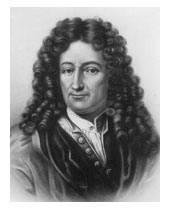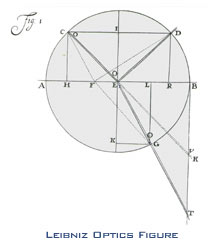Gottfried Wilhelm von Leibniz
In searching for a name for this new educational institution, the
Board of  Trustees
sought to find a name that would exemplify an international and
interdisciplinary approach to education and learning. We arrived
at the name of Leibniz from the seventeenth century mathematician,
philosopher and political advisor Gottfried Wilhelm Leibniz. Trustees
sought to find a name that would exemplify an international and
interdisciplinary approach to education and learning. We arrived
at the name of Leibniz from the seventeenth century mathematician,
philosopher and political advisor Gottfried Wilhelm Leibniz.
Leibniz
was born in Leipzig on July 1, 1646, and he died in Hanover on December
14, 1716. Leibniz has been called the Aristotle of the seventeenth
century and was a man characterized by avid desire for learning
and knowledge, in all areas. Truly a renaissance man as that term
has come to mean in our contemporary and specialized world.
Leibniz is credited with being the father our modern calculus, as
well as a substantial contributor to the areas of algebra and the
physics of mechanical energy. As a contemporary of Isaac Newton,
the two mathematicians and philosophers engaged in a many year debate
over the laws of mathematics and nature. The contributions both
made endure today. In fact, Leibniz is credited with being the first
person to recognize the importance of binary system of notation.
The basis of modern computers is inextricably linked to the binary
notation system. He devised a calculating machine that was the envy
of its day, with the capacity to add, subtract, multiply and divide.
In the area of science and math, Leibniz displayed forward thinking
and scholarly mastery.
 Leibniz
was a member of the Royal Academy of Science in London and the Academy
of Sciences in Paris. He and Newton were elected as the first foreign
members of the prestigious Parisian Academy of Sciences. In 1700,
Leibniz induced King Frederick I of Prussia to found the Academy
of Sciences in Berlin and Leibniz became the founding president. Leibniz
was a member of the Royal Academy of Science in London and the Academy
of Sciences in Paris. He and Newton were elected as the first foreign
members of the prestigious Parisian Academy of Sciences. In 1700,
Leibniz induced King Frederick I of Prussia to found the Academy
of Sciences in Berlin and Leibniz became the founding president.
In addition to his work in science and math, Leibniz was an international
traveler and an advisor to King Frederick I of Prussia, George I
of Great Britain, when he was the elector and Peter the Great, Tsar
of Russia. As a diplomat Leibniz attempted to dissuade King Louis
XIV of France from invading Germany and waging a campaign in Egypt
instead. Louis XIV was not dissuaded, but Napoleon Bonaparte heeded
that advice a century later. Leibniz, as a diplomat, attempted to
reconcile, without success the Catholic and Protestant churches.
He was trained in philosophy, languages and law and contributed
to the political and philosophical writings of the time in a number
of European countries. In writing of the times he was in, Leibniz
published a philosophical treatise in French trying to demonstrate
that his time and place was “the best of all possible worlds”
a phrase and attitude that was to be satirized by Voltaire in Candide.
It is the spirit and life of learning and investigation evidenced
by Leibniz in his math and science and his diplomacy and writing
that exemplify the attitude we wish to convey to our students. Leibniz
involvement throughout the world of his day in science and politics
represents the best goals of academic learning and practical impact
in the world. The Board of Trustees believes the University Institute
that is his namesake will provide students the opportunity to follow
a path similar to his.
|
|



 Trustees
sought to find a name that would exemplify an international and
interdisciplinary approach to education and learning. We arrived
at the name of Leibniz from the seventeenth century mathematician,
philosopher and political advisor Gottfried Wilhelm Leibniz.
Trustees
sought to find a name that would exemplify an international and
interdisciplinary approach to education and learning. We arrived
at the name of Leibniz from the seventeenth century mathematician,
philosopher and political advisor Gottfried Wilhelm Leibniz. Leibniz
was a member of the Royal Academy of Science in London and the Academy
of Sciences in Paris. He and Newton were elected as the first foreign
members of the prestigious Parisian Academy of Sciences. In 1700,
Leibniz induced King Frederick I of Prussia to found the Academy
of Sciences in Berlin and Leibniz became the founding president.
Leibniz
was a member of the Royal Academy of Science in London and the Academy
of Sciences in Paris. He and Newton were elected as the first foreign
members of the prestigious Parisian Academy of Sciences. In 1700,
Leibniz induced King Frederick I of Prussia to found the Academy
of Sciences in Berlin and Leibniz became the founding president.